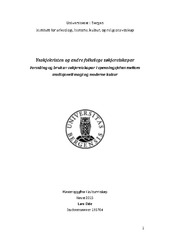Ynskjekvisten og andre folkelege søkjereiskapar. Forståing og bruk av søkjereiskapar i spenningsfeltet mellom tradisjonell magi og moderne kultur
Master thesis
Permanent lenke
https://hdl.handle.net/1956/10619Utgivelsesdato
2015-09-01Metadata
Vis full innførselSammendrag
Folkelege søkjereiskapar, som ynskjekvisten, er grunnlaget for denne studien av røyndomsoppfatningar innan alternativmiljøet i Noreg. Ynskjekvisten vart brukt til å finna vatn og metall i mellomalderen, i dag er den ein del av eit anna verdsbilete og nye bruksområde har kome til. Med ein kvalitativ tilnærming til ynskjekvistfenomenet, vil eg analysera det prosessuelle gjennom folk sine førestillingar knytt til ulike tidsperiodar i samfunnet i dag samanlikna med ein historisk kontekst This thesis is an analysis of the cultural processes that led from an older more magical use of dowsing to how dowsing is used and understood by those who use these tools today. I have been looking for the changes of dowsing equipments both with regard to form and use, and also how the notion of dowsing has adapted and changed as society has modernised. The development of new world views has also changed people's perception of dowsing. In Scandinavia, I have found that before the 20th century the notion of dowsing was more connected to an older magical worldview - connected to folk belief and tradition - that was more bounded by strict rules. Today, the magical understanding of the world has a more private" and individualistic character, and has become part of what is often called «New Age» (alternative movements), and other religious movements. Dowsing was a part of an older magical worldview that the church tried to exterminate during the reformation, like many other forms of «magical» practices. My sources from the 19th century seem to be closer to the older magical belief, bound to rituals when getting the rod, or what type of tree one should use. From the 20th century I have used Norwegian studies and books that explain practise and theories on how the phenomenon works. Sigvald Hasund did a study on the Y-shaped rod for the Norwegian agricultural college in 1921. Among his findings was that it is your intuition that «knows» where the energy - water, metal, hidden things, animals or people, or other energies - that you are searching for is hidden. The rod is there to let you actually know when you have hit the spot where the water is. This explanation is still the most favourable among dowsers in Norway today.
